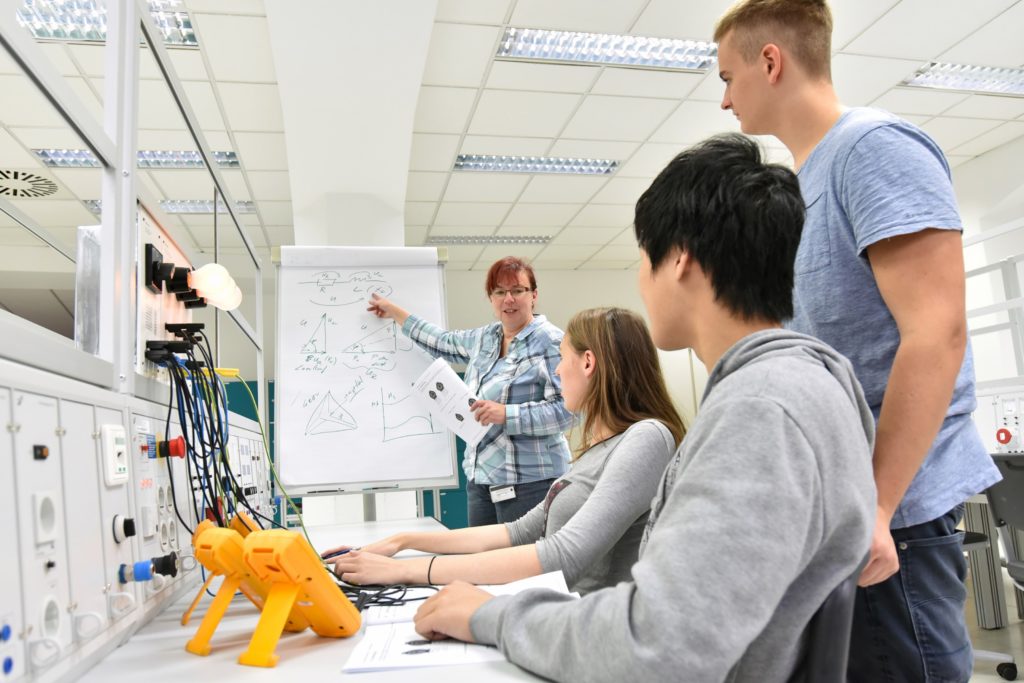Innovate to highlight the sectors that participate in the industries of the future
Building and public works, new energies, digital, metallurgy… the industries of the Future do not lack opportunities. Despite this, the jobs linked to these sectors are currently under pressure and they are struggling to attract candidates. A still prejudicial image emerges from the industry where working conditions are characterized as hard and not very rewarding. However, sectors such as logistics, transport and energy are resolutely modern and innovative in France, and the prospects for the future are rich and ambitious. The orientation towards these industries of the future is a key issue. To boost the sectors, we are seeing the development of the Campus of trades and qualifications in the country.
Since 2014, the sectors of excellence in France have been able to benefit from a label entitled Campus des métiers et des qualifications. This label designates an innovative network of partner actors to develop a wide range of vocational training courses (technological and general) centered on specific sectors and on a strategic sector of activity. These campuses are places of innovation where the creation of prototypes is encouraged thanks to the provision of technical facilities, for example. They are also nodes of opportunity for local economic players by providing talent trained in a field of excellence.
There is now more than a hundred Campus des métiers et des qualifications, labelled between 2014 and 2018 for a period of 1 to 5 years, which help to give visibility and increase the attractiveness of key sectors, particularly industry. However, other examples tend to follow the same logic by highlighting a sector in its entirety, such as in the Lille Metropolis with Euralogistic, a collaborative platform and economic cluster created in 2003 around the logistics sector.
Euralogistic, which is supported by the CCI network, offers a range of services to these players and networks companies, training, and research around concrete and innovative projects. The Euralogistic regional center of excellence aims to disseminate and promote logistics know-how throughout the Hauts-de-France region to companies (logistics operators, transport, industry, distribution, e-commerce, etc.), ports and logistics platforms, training and research organizations, local authorities and specifiers, professional bodies, and employment players.
Supported by local authorities and companies, these campuses are built around a sector of excellence corresponding to a national or regional economic issue and therefore offer significant employment opportunities for the territory in question. In fact, these are either job-creating sectors (industry, digital) or sectors of the future such as the energy transition, health and the life sciences economy or information security.
Learn more about the challenges of the industry of the future >
Proposing a positive image of the jobs in tension in a playful way
To attract young people to the professions of the industries of the future, it is necessary to have a playful and educational approach. New technologies make it possible to offer an immersive and attractive approach thanks to high-performance tools that resonate with the target audience.
An instructive and very innovative place is, for example, the Espace Champions de l’Industrie located in the heart of the Quartiers Politique de la Ville (QPV) of Le Havre. Composed of a space with practical workshops to discover the different trades in industry, this orientation center aims to remove stereotypes about these trades, which are considered difficult and demeaning. Visitors are invited to try out jobs such as boilermaker, welder, or industrial programmer. An Escape Game has also been designed to raise awareness of the industrial environment, its safety rules, and Personal Protective Equipment (PPE). The location in the heart of neighborhoods where youth employment is a fundamental issue, combined with pleasant and immersive workshops, is a real success for this space which succeeds in directing its visitors towards the training and jobs of tomorrow’s industries.
In the same spirit of gamification, the startup WiXar has also decided to seize this challenge of attractiveness by proposing games and training through virtual reality to create the conditions for immersion. This startup has launched TestUnMétier to discover the Port professions in the South of France in particular. This allows potential candidates to test the trades without worrying about security or the availability of companies thanks to a virtual reality headset. The experience gives an idea of the daily life and the environment in which the job is carried out. In this way, the candidate can discover jobs in different sectors in the same place, beyond what is offered in his or her home territory. The technology thus highlights little-known or stereotyped occupations that suffer from a retrograde image and are not very accessible at first sight.
In addition, other solutions need to be (re)thought through, such as internships in the ninth grade or a tour of trades. The UIMM (Union des Industries et Métiers de la Métallurgie) has offered several young people, as part of their 9th grade internship, an immersion in the branch’s training center to discover all the associated trades. This has the advantage of providing an exhaustive overview of opportunities at local level and changing the way people look at trades that are not very attractive and often perceived as not very modern. In addition, the Agence Régionale de l’Orientation et des Métiers de la Région Normandie organises the “Tour des métiers” to present local opportunities. This initiative allows people to explore careers in seven towns in the region through activities and to build their own career path.
Focus on innovative teaching methods by capitalizing on the synergy between players
To make a real career pathway a success, the objective is to unite very different players around the same project, but all of whom are stakeholders in a common ambition for the future. The industries of the future are a very good example of how to get companies, local authorities, employment, and training players on board in the same direction. One success in this respect is the model of the 41 Production Schools in France today, which have a professional integration rate of almost 100% at the end of their training and a 90% success rate at the C.A.P. and Bac Pro.
The Production Schools are private, non-profit technical education establishments recognized by the State. They offer training in close collaboration with the professional branches that recruit. Young people aged 15 to 18, accompanied by their teacher, respond to real orders placed by private or industrial clients. This anchoring in economic life enables the development of adapted training courses where the outlets are real, and the young people quickly gain in professionalism thanks to the customer relationship. Working in synergy with other players is therefore a proven method that is tending to develop, and guidance is now seen as a transversal pathway.
To sum up, guidance pathways must innovate to attract people who are far from employment through various complementary strategies. This concerns both the vocational sectors and the regions, which are responsible for guidance and which, in short, play a role in the economic competitiveness of the territories. The development of the attractiveness of key sectors must be pushed forward by highlighting sectors of excellence, sectors in tension and by fun and educational approaches so economic and training players no longer work in silo. Another ambitious example is the Noria project in the Grand Est region, which aims to create a hybrid universe combining physical and virtual immersion, for a successful path to higher education in Alsace. Beyond orientation, recruitment must also offer innovative modules to select talents based on their skills, where diplomas are still the norm.
[1] U.S. Department of Labor.
[2] Jeunes de 15 à 29 ans, INSEE.
About the author,
Djibril, Consultant in Alcimed’s Innovation and Public Policies team in France



